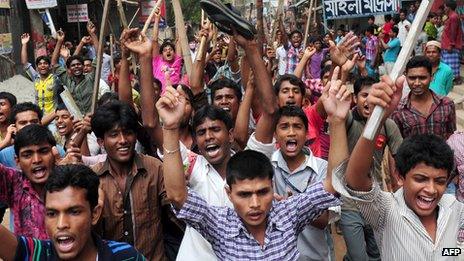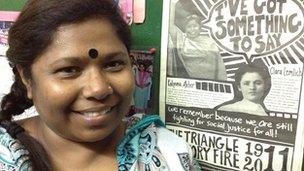Dhaka factory collapse: Three months on
- Published
Watch: Three months on from the terrible collapse of a factory in Dhaka, fears remain about the safety of the four million workers in the garment industry.
Strange things have been happening at some clothing factories in Bangladesh.
Since the Rana Plaza factory building collapsed three months ago killing more than 1,100 people, hundreds of textile workers have been falling ill en masse, blaming drinking water or bad food.
But tests have revealed nothing unusual.
In another instance, production at a factory was halted after workers reported sightings of a ghost. Work could only resume after special prayers.
Public health officials suspect the phenomenon is "mass hysteria" - a panicked reaction to the recent deaths of so many fellow workers.
Painful memories aside, realities on the ground are not helping either.
There are regular reports of cracks in buildings and fires at factories in Bangladesh's ready-made clothing industry, which, with an annual turnover of $21bn (£14bn), is now second in size only to China's.

In the immediate aftermath of the Rana Plaza collapse, there was a chaotic rush to inspect factories at apparent risk.
Multiple government departments, Western retailers and an influential trade body, the Bangladesh Garment Manufacturers and Exporters Association (BGMEA), have been carrying out their own investigations.
An initial visual inspection of 102 buildings, including 60 garment factories, by experts at the country's leading engineering university found that most had some structural problems.
In the weeks following the April disaster, more than a dozen clothing factories were shut down amid safety concerns.
Global outcry
The official response to one of the world's worst industrial disasters has been swift.
In late June, the United States revoked preferential trade privileges for Bangladesh until reforms in the clothing industry were carried out. The EU has also put conditions on Bangladesh maintaining its lucrative duty free access to its clothing markets.
Both the EU and the US - the top two destinations for Bangladesh's clothing exports - have put special emphasis on the passing of a new labour law, which will ensure freedom of association and collective bargaining rights.
Bangladesh's parliament passed a labour law with new amendments on 15 July.
But the International Labour Organization (ILO) and various rights groups, including New York-based Human Rights Watch, have said that while the new law makes some improvements, it falls short on key issues.
The ILO's concerns include a condition in the new law that at least 30% of all workers at an establishment have to sign up first to form a union and not giving freedom of association rights to workers at export processing zones.
Responding to some of the criticism, Mikail Shipar, Bangladesh's Labour and Employment Secretary, said: "It is the best labour law - so far."
"Of course, it can be improved. But it will take more time. In this moment, we are unable to allow more than three trade unions in a factory. We are [also]unable to introduce outsiders [- officials employed by the union rather than the company -] in a trade union."

Some factory workers have taken matters into their own hands
Crucial months
The other big concern since the Rana Plaza collapse has been how to make Bangladesh's clothing factories safe.
Retailers on both sides of the Atlantic have so far signed up to two different safety plans.
More than 70 clothing brands, mainly from Europe, have joined a legally binding safety pact launched by global unions. The plan includes inspections of factories that supply the brands' clothes and provides financing to fix any problems that are identified.
A separate North American safety alliance has announced plans to provide loans to fix or relocate structurally unsound buildings. It has been criticised by unions, however, for not being legally binding. And some major brands, including Top Shop and the Japanese company Uniqlo, have not yet signed up to either the pact or the alliance
These plans are in addition to a national Bangladeshi plan being facilitated by the ILO.
"One of the important commitments is to assess all the ready-made garment factories in Bangladesh by the end of this year. It is estimated that some 3,500 factories are there," says Srinivas B Reddy, country director for the ILO in Bangladesh.
Mr Reddy points out that common safety standards need to be agreed for all the public and private initiatives to help workers.
"The coming months are crucial," he says.
'My factory is not safe'
With all the promises made by governments and brands, do the workers now feel safe?
Kalpona Akter, a prominent labour rights activist, says while much action has been promised, it still remains at the policy level.

Kalpona Akter says more needs to be done to improve worker safety
Workers at factories don't know about it, and are yet to benefit from any proposed measures, she says.
But they are taking matters into their own hands.
"On the ground level, workers are taking some initiatives to make changes. Like whenever they see these sparks in the factory, or the crack in the buildings, they are walking out from the factory," says Ms Akter, who is executive director at the Bangladesh Centre for Workers Solidarity.
"They are saying, 'My factory is not safe. And, until it is safe, I will not come back.'"
Three months on, the aftershocks from the collapse of Rana Plaza can be felt at the boardrooms of major companies and in the corridors of governments.
The deaths of so many people three months ago may have prompted a global outcry. But Bangladeshi workers know that changes on the ground will take time.
- Published12 July 2013
- Published10 July 2013
- Published8 July 2013
- Published5 July 2013
- Published14 May 2013